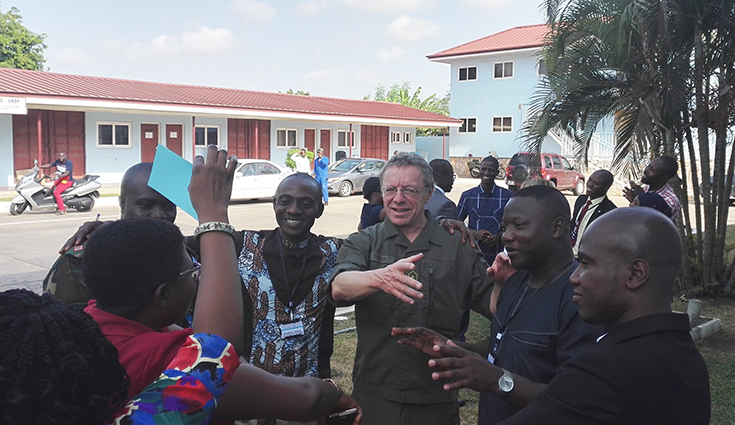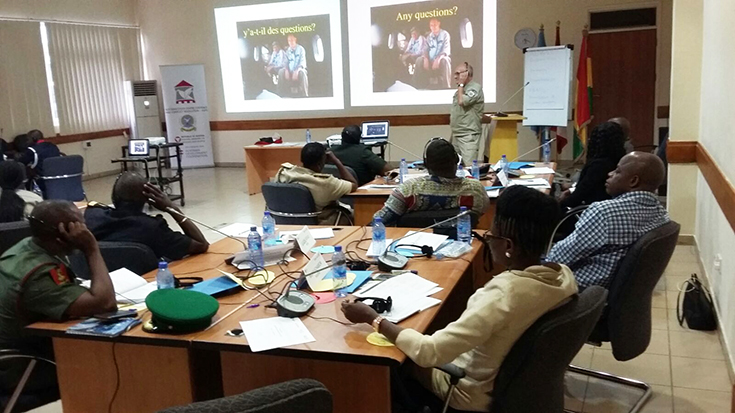Humanitarian assistance in West Africa
Editorial Advisory Panel Member Brigadier General Alois Hirschmugl describes a recent course held in West Africa that aims to break down walls between civil society, the military and police, so as to encourage more co-operation in times of crisis and disaster

The fourth Humanitarian Assistance in West Africa (HAWA) training course was conducted at the Kofi Annan International Peace Keeping Training Centre in April 2018. Titled ‘Support to Capacity-Building for Enhanced Peace and Security in the Economic Community of Western African States (Ecowas) Region’, the overarching aim of the project is to promote sustainable development in the region by fostering peace and human security.
This is an integral part of a joint project that was developed in 2012 as a co-operative effort among the Austrian Federal Ministry of Defence and Sports (MoDS); the Austrian Development Agency (ADA); the Austrian Federal Ministry for Europe, Integration and Foreign Affairs; and the Austrian Study Centre for Peace and Conflict Resolution (ASPR) within the framework of a whole-of-government approach. It is integrated in the Austrian 3C initiative, which aims to support the development of a co-ordinated, coherent and complementary strategy that can be used by state institutions and non-governmental actors and applied in the fields of security and development.
Between April 2017 and March 2018, four HAWA core courses were conducted, with up to 456 applicants for 25 seats on one course, as well as one training the trainers course. Overall, this means that more than 130 people from the West African region have been trained in emergencies, response mechanism in place (United Nations Office for the Co-ordination of Humanitarian Affairs, European Union, African Union, Ecowas, etc), UN civil-military co-ordination, on site operations co-ordination center, forced migration, humanitarian programme cycle, negotiation, mediation and media.

One of the course’s intentions was to bring together people from civil society, military and police – to work together, to learn about each other’s mandate, as well as break down walls between each other. This is because in any disaster situation, you will always meet with other agencies, such as the military, so it is important to know each other’s procedures and mandates in advance, and to respect each other. The courses were conducted in English and French with simultaneous translation.
Feedback from participants was positive, highlighting how relevant it is for people who must work together in a natural, human-caused or environmental disaster, as well as in conflict situations in the region. One person told us that the course said it enlightened her work as a liaison officer now in South Sudan.
Now that the two project phases have concluded, the As the two project phases are over now, a third one is in the planning phase which also includes a mobile training version in some countries of the region.
Author: Alois A Hirschmugl is a Member of CRJ’s Editorial Advisory Panel, Brigadier General (Active), Professor, Legal and Humanitarian Affairs Advisor to the Austrian Chief of Defense Staff; Trainer and expert for international disaster management; Technical Director of DMAT Consulting KG; United Nations Disaster Assessment and Co-ordination (UNDAC) Member since 1999, with with nine international missions.
Since 2006 Hirschmugl has also been an EU Civil Protection (UCP) expert with two international missions. He is a partner in EU Framework Programme 7 / Horizon 2020 Research projects (Space, Disaster Resilience and Security) and project initiator at the Kofi Annan International Peace Keeping Training Centre in Accra/Ghana for the ‘Humanitarian Assistance in West Africa and Beyond’ training course for military, police and civilians. He holds a Masters and Doctorate degree in Law and has published a handbook on the legal aspects for peace support operations, humanitarian and disaster management operations.
Alois Hirschmugl, 02/04/2018